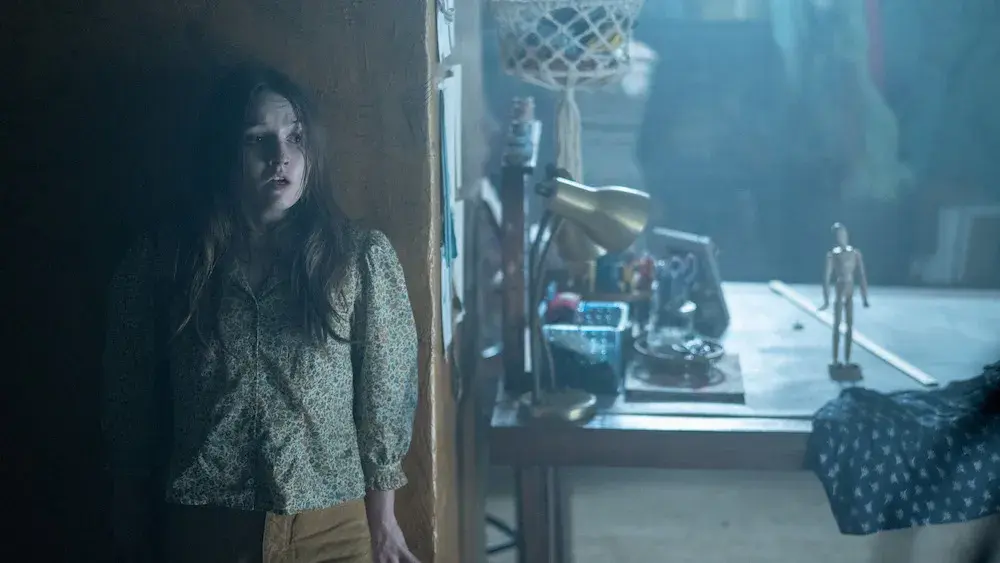
No One Will Save You is a captivating psychological thriller that pushes the boundaries of suspense and horror, blending elements of isolation, fear, and survival. Directed by Brian Duffield, the film stands as a unique entry in the genre, offering a deeply emotional yet terrifying experience. With minimal dialogue and a focus on atmosphere and tension, the movie draws the audience into a world where terror is not only external but internal, as the protagonist grapples with her own past and the dark forces that invade her life.
Plot Overview: Isolation and Intrigue
The film centers on Brynn, a young woman living alone in a remote, decaying house in the middle of nowhere. The setting itself—isolated and desolate—immediately sets the tone of vulnerability and dread. Brynn is trying to move on from a past marked by trauma and guilt, and the solitude of her environment seems both a source of peace and a reminder of her inner turmoil.
However, her quiet existence is shattered when she encounters a series of mysterious, otherworldly events. Strange figures and unexplainable phenomena begin to invade her home, leading to a descent into chaos and terror. As the events grow increasingly bizarre and terrifying, Brynn must confront not just the external threats but also the emotional ghosts of her past. The film’s title, No One Will Save You, suggests that the horror Brynn faces is not only from the forces outside her but from within herself as well.
A Quiet but Intensely Psychological Experience
What makes No One Will Save You stand out is its focus on psychological horror rather than relying on overt supernatural creatures or gore. While the film does feature elements of alien encounters, its true power lies in how it explores Brynn’s psychological state. As she faces the frightening occurrences, her emotional breakdown becomes just as important as the external threat. The film uses tension, silence, and minimal dialogue to create an oppressive atmosphere that makes every moment feel loaded with fear.
The lack of spoken words throughout the film amplifies the loneliness of Brynn’s character. Much of her internal conflict is expressed through her actions, facial expressions, and the disturbing events around her. This lack of dialogue forces the audience to focus on the visual and auditory elements of the film, making the small details—such as a creaking floorboard or a shadow flickering in the corner—feel infinitely more intense and unnerving.
Isolation as the Ultimate Fear
Isolation plays a central role in the story, both as a thematic element and as a narrative device. Brynn’s isolation in her home is mirrored by her emotional detachment, which is rooted in a tragic event from her past. The house becomes a physical manifestation of her inner loneliness, with the eerily quiet environment highlighting her sense of abandonment and hopelessness. The presence of strange, malevolent forces in the house only serves to intensify her fear, as she realizes she may be the only one who can save herself, but she’s unsure how.
The film masterfully uses this sense of isolation to create a slow-burn tension. The audience, much like Brynn, feels trapped in the small, confined space of the house, unable to escape from the horrors that continue to unfold. This claustrophobic atmosphere enhances the sense of dread, making the viewer feel just as disconnected from the outside world as the protagonist does.
The Horror of the Unknown
Another key aspect of No One Will Save You is its exploration of the horror of the unknown. While there are strange and supernatural elements at play, the true terror comes from the uncertainty of what is happening and why. The alien-like figures that appear are unsettling, not because they are grotesque or over-the-top, but because they remain enigmatic and incomprehensible. This leaves the viewer—and Brynn—unable to understand the nature of the threat, creating a pervasive sense of fear and anxiety.
The film’s pacing is deliberate, with much of the tension building through slow, methodical reveals. There are no quick scares or loud moments of chaos; instead, the fear comes from the quiet moments of uncertainty, the fleeting glimpses of figures in the shadows, and the unsettling noises that echo through the empty house. It’s a film that thrives on anticipation, making the audience’s imagination just as much a part of the horror as what’s actually shown on screen.
The Emotional Core: Facing the Past
While the supernatural elements of No One Will Save You are undeniably terrifying, the film’s emotional core lies in Brynn’s confrontation with her own past. The trauma she carries, particularly the guilt and grief associated with an event from her history, forms the backbone of the story. As the horrors escalate, Brynn is forced to confront her emotions, her memories, and her actions in order to survive.
This personal journey adds depth to the narrative, transforming the film from a mere horror flick into a poignant exploration of grief, forgiveness, and redemption. The film suggests that the greatest battle Brynn faces is not against the strange forces in her house, but against the darkness within herself. It’s a powerful reminder that the past can haunt us in ways we may not fully understand, and sometimes, the scariest monsters are the ones we carry with us.
Conclusion: A Unique and Terrifying Experience
No One Will Save You is a brilliant and haunting thriller that stands apart from typical horror films by focusing on psychological terror, isolation, and emotional conflict. The combination of an eerie, minimalist setting, a deeply flawed protagonist, and a slow-building sense of dread makes this film an intense and immersive experience. It’s a movie that asks more from its audience than just to be scared; it challenges viewers to engage with the emotional and psychological depth of its narrative, all while delivering an atmosphere of terror that will linger long after the credits roll.
In the end, No One Will Save You is a chilling meditation on fear, loneliness, and the darkness of the human psyche. It’s a film that will leave you thinking—not just about the supernatural events on screen, but about what it means to confront the things that haunt us, both seen and unseen.





